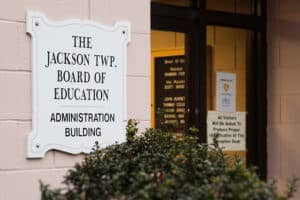
JACKSON – A speaker at the latest Board of Education meeting gave a presentation to show board members how to navigate the sometimes complicated ethics rules in New Jersey.
During the board’s Jan. 16 meeting, members heard from Dr. Phillip W. Nicastro, Esq. of the Toms River firm of Strauss Esmay Associates School Policy and Regulation Consultants. He showed a PowerPoint presentation while speaking about board ethics. He said his visit was part of the duties of his firm. “We have contracts with 500 school districts and each year we have a discussion like this,” Nicastro said.
“There is a code of ethics for school boards, a set of standards that involve the collection of various documents,” Nicastro added.
Nicastro said his firm helps board members to discuss, adopt policy and procedures in understanding the code of ethics and providing documentation that board members receive and review a code of ethics.
“It is hard to understand what all the (documents) mean. The only way we understand them is to consult with the School Ethics Commission and ask for an advisory opinion. While it is not binding under law it is generally followed. They can issue subpoenas and hold hearings. If a board member does not like a decision made they can appeal it to the commission,” Nicastro said.
According to the School Ethics Commission website the commission is a nine-member body with the power to issue advisory opinions, receive complaints, receive and retain disclosure statements, conduct investigations, hold hearings, and compel the attendance of witnesses and the production of documents as it may deem necessary to enforce the School Ethics Act. School Ethics Commission Members are appointed by and serve at the pleasure of the Governor. The Commission is established in the New Jersey Department of Education.
Nicastro said he’d been involved in 60 advisory opinions has heard a variety of cases. He also served as a school district administrator.
During the presentation, Nicastro touched on issues concerning situations of prohibited acts. No school official or immediate family members may have interest in business organization or engage in business that is in substantial conflict with proper discharge of their duties, for example.
Other prohibited acts state that no school official shall act in official capacity in any matter where he/she has an interest or direct or indirect financial involvement that might reasonably impair judgment or matter that creates some personal benefit.
No school official shall undertake any employment or service, compensated or not, which would reasonably expect to prejudice their judgment.
Nicastro gave the example of board member of another district who wanted to sit in on an exit interview of a district employee. That was not allowed.
The presenter also touched on issues of donations. No school official, immediate family member or business organization in which he has interest shall accept anything of “value” for the purpose of influencing directly or indirectly discharge of duties (campaign contribution exception).

“If a board member feels uncomfortable in voting on a certain matter relative to the district they should probably step down on that vote,” Nicastro said.
Board members were surprised to learn that they could in fact donate money to the district.
The 10 requirements for all board members include upholding and enforcing rules and laws, confining responsibilities to policy making and not administering, holding confidential information, having independent judgment, appointing the best qualified, and supporting and protecting school personnel in proper performance of their duties.
Board members must also refer all complaints to the chief administrative officer and act on complaints at public meetings only after failure of administrative solutions.
Nicastro’s presentation satisfies a board member code of ethics requirement that the board discuss the board ethics and code of ethics at a regularly scheduled public meeting once a year.
The board must also adopt policy and procedures for the training of board members regarding school ethics act and code of ethics and each member must sign an annual acknowledgement that the Code of Ethics was received and reviewed.






